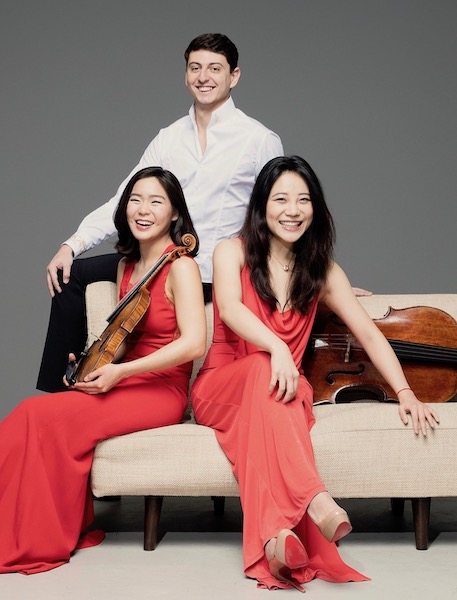Z.E.N. Trio lights up FIU with electrifying performances

While many ensemble players thrive in the chamber music repertoire, this most intimate of performance genres can sometimes be challenging for musicians who frequently perform as instrumental soloists.
Two of the three players in the Z.E.N. Trio which was presented by Friends of Chamber Music and the FIU Music Festival on Wednesday night, have outstanding solo careers and have performed in South Florida. Violinist Esther Yoo’s 2017 recital for Julian Kreeger’s series was one of the sleeper events of that year. Cellist Narek Hakhnazaryan, Gold Medal winner of the 2011 Tchaikovsky Competition, gave an electrifying performance of Dvorak’s Cello Concerto in 2013 at West Palm Beach’s Kravis Center. Joined by pianist Zhang Zuo (a fellow BBC New Generation Artist in 2015), the players exhibited the musical intelligence and finely blended timbres of the best chamber groups.
Despite sparse attendance in a chilly Wertheim Performing Arts Center, the players generated considerable heat. Even in the serene melodic strains of Schubert’s Notturno in E-flat, Yoo and Hakhnazaryan’s string lines were articulated in a highly assertive manner. Playing barefoot, Zuo’s sensitive touch and musicality matched Schubert’s lyrical paragraphs.
Although written in 1952, Armenian composer Arno Babjanian’s Piano Trio in F-sharp minor could have been composed in the 19th century. Unabashedly romantic in spirit, the score abounds in attractive thematic invention. Two slow movements suggest Armenian-accented Tchaikovsky while the rhythmic finale mirrors Khachaturian but with greater sophistication. Some of Babjanian’s music tends to wander aimlessly but the work’s melodic underpinnings ultimately succeed, especially in the bravura reading by the Z.E.N. players. (The group takes its name from the members’ first-name initials.)
The burnished mahogany of Hakhnazaryan’s cello and Yoo’s tonal sweetness gave voice to the second movement Largo. The concluding movement was played at white heat with Zuo’s pounding chords ringing decisively. Whether assaying expansive outbursts or vigorous fragmentary motifs, the three players’ blending and coordination was admirably unified and precise.
Shostakovich’s Piano Trio in E minor is one of the masterpieces of 20th century chamber music. The players matched the 1944 wartime score’s blend of lamentation and unbridled energy in a performance of searing emotional intensity. At the outset of the initial Andante, Hakhnazaryan’s bowing close to his instrument’s bridge sounded like a sigh from a distant place, With Yoo and Zuo adding harmonic weight, that cry morphed into a chorale, both eloquent and powerful. They captured the unhinged abandon of a Russian dance running off the tracks in the Allegro con brio.
The soulful dialogue between instrumental voices of the Largo finds Shostakovich at his most personal and inspired, From Zuo’s spaced bleak opening chords, the depth of tonal hues and expressive darkness seemed to inhabit the astutely balanced traversal. Some of the quietest moments in the movement were the most telling and insightful, so varied were the group’s dynamic gradations. Zuo attacked the Judaic-flavored theme of the final Allegretto with percussive authority.
The trio brought out the music’s agitated violence with unrestrained force. The quiet poignancy of the score’s final bars was all the more deeply felt after the racing deluge of notes that had come before. For sheer edge-of-the-seat velocity and inner turmoil, the Z.E.N. Trio’s performance would be hard to surpass.
For an encore, the players switched gears with a broadly spun version of Rachmaninoff’s Vocalise. The softness of Yoo’s sound contrasted nicely with the warmth and large sonority of Hakhnazaryan’s statement of the iconic melody. This first-rate trio needs to be heard again in Miami with further exploration of the piano and string literature.
The Friends of Chamber Music and FIU Music Festival presents flutist Maxim Rubtsov, clarinetist Alexander Fiterstein and pianist Natasha Paremski in a program featuring Ravel’s Gaspard de la Nuit and Saint-Saëns’ Clarinet Sonata 4 p.m. Sunday at the FIU Wertheim Performing Arts Center in Miami. miamichambermusic.org
The concert replaces the originally scheduled performance by the Borodin Quartet which has cancelled its American tour due to the emergency hospitalization of one of its members.
Posted in Performances
Leave a Comment
Thu Oct 31, 2019
at 1:14 pm
No Comments






